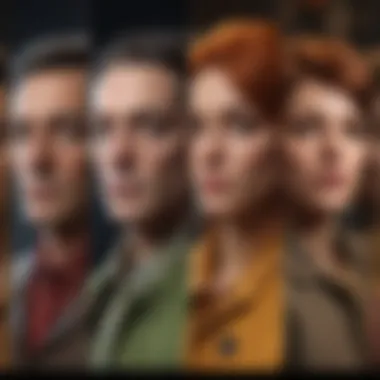Unveiling the Intricacies of the Iconic 70s Show Seasons


Overview of Cinema/TV shows/Games/Comic Books
In-Depth Analysis
Plot Summary and Analysis
Mischievously weaving through the intricacies of suburban life, the show painted a vivid tableau of the '70s, capturing the essence of an era marked by rebellion and change. Each season unfolded with meticulous detail, delving into the dilemmas faced by the characters as they navigated love, friendship, and coming-of-age challenges.
Character Development
The brilliance of the 70s Show lay in its ability to construct characters with depth and authenticity. From the endearing awkwardness of Eric Forman to the uninhibited spirit of Steven Hyde, each character blossomed over the seasons, revealing layers that resonated with viewers. Through subtle nuances and profound transformations, the characters mirrored the metamorphosis of the '70s generation.
Setting and Cinematography for Cinema/TV shows
Crafting a visual narrative that paralleled the unfolding drama, the show's setting and cinematography played a pivotal role in imbuing each scene with nostalgia and emotional resonance. From the retro charm of the Forman living room to the bustling streets of Point Place, the attention to detail in set design transported viewers to a bygone era, immersing them in the world of the show.
Behind the Scenes
Interviews with Cast and Crew
Peering behind the curtain of production, interviews with the cast and crew offer a glimpse into the creative vision that brought the 70s Show to life. From anecdotes about on-set camaraderie to insights into character development, these interviews enrich our understanding of the intricate tapestry woven by the talented individuals who breathed life into the show.
Development Process for Games/Comic Books
For games and comic books inspired by the 70s Show, understanding the development process is key to appreciating the complexities of adaptation and creative reinterpretation. From conceptualization to execution, tracing the evolution of these mediums sheds light on the challenges and triumphs of translating a beloved TV show into interactive or graphic formats.
Production Insights for Cinema/TV shows
Unveiling the behind-the-scenes magic that culminated in the creation of the 70s Show, production insights offer a glimpse into the meticulous planning and execution that went into each episode. From scriptwriting sessions to set construction, these insights illuminate the collaborative effort that shaped the show's enduring legacy.
Reviews and Recommendations
Critic Reviews and Ratings
As a barometer of critical reception, diving into critic reviews and ratings provides a multifaceted perspective on the show's impact and artistic merit. Beyond mere entertainment, critics dissected the show's thematic depth, character dynamics, and narrative arcs, offering insights that enrich our appreciation of its cultural significance.
User Reviews and Comments
In a realm where fan opinions reign supreme, user reviews and comments serve as a platform for impassioned debates, theories, and revelations. Venturing into the digital forums and social media threads unveils a tapestry of diverse viewpoints, from nostalgic reminiscences to critical appraisals, that collectively shape the fan discourse surrounding the 70s Show.


Recommendation Lists Top Picks, Hidden Gems, etc.
Curated recommendation lists serve as signposts in a vast landscape of entertainment, guiding viewers towards hidden gems and unexplored narratives. Whether unearthing lesser-known episodes that encapsulate the show's essence or highlighting fan-favorite moments, these lists offer a curated lens through which to revisit the timeless allure of the 70s Show.
Introduction
Overview of the 70s Show
The 70s Show, a masterpiece of television artistry, introduced viewers to a captivating world filled with vibrant characters, dynamic narratives, and an authentic portrayal of the 1970s era. Each episode not only entertained but also provided a window into the societal norms and challenges of that time, making it a cultural phenomenon that transcended generations. Through this section, we will delve into the core essence of the show, dissecting its thematic elements and narrative structure to illuminate its enduring appeal.
Significance of the 70s Era
The 1970s era was a transformative period marked by social upheaval, political unrest, and cultural revolutions. It was against this backdrop that the 70s Show emerged as a beacon of creativity, reflecting the ethos of the times with unparalleled authenticity. By exploring the significance of the 70s era within the context of the show, we aim to unravel how its narrative resonated with audiences and left an indelible mark on the fabric of television storytelling. Join us as we dissect the layers of this era and uncover its profound impact on popular culture.
Season 1: Setting the Stage
The inception of Season 1 sets the foundation for the entire series, establishing the tone and introducing viewers to the distinct world of the 70s Show. This crucial season lays the groundwork by presenting pivotal aspects such as character introductions, initial plot setups, and thematic elements that will resonate throughout the show.
Season 1 serves as a crucial building block, not only in terms of narrative development but also in shaping the personalities and relationships that will undergo evolution in subsequent seasons. This season masterfully captures the essence of the 70s era, reflecting on societal norms, cultural references, and the overarching ambiance of the time.
One of the primary benefits of Season 1 is its ability to immerse the audience in a nostalgic journey, providing a glimpse into the past while offering contemporary perspectives on timeless themes. The season carefully balances elements of humor, drama, and character dynamics, setting the stage for the intricate storytelling that unfolds as the series progresses.
Considering Season 1 of the 70s Show, viewers are presented with a rich tapestry of characters, each bringing their unique quirks and idiosyncrasies to the forefront. The season meticulously crafts these characters, establishing their individual quirks and dynamics, laying the groundwork for the complex interactions and growth they will undergo in subsequent seasons.
As viewers delve into Season 1, they are encouraged to pay attention to the subtle nuances and details that contribute to the overarching narrative arc. From subtle foreshadowing to nuanced character development, this season offers a wealth of information and insight that will pave the way for the overarching storylines and character arcs that will unfold in later seasons.
In essence, Season 1 of the 70s Show is more than just an introductory segment; it is a gateway to a vibrant universe filled with depth, humor, and human complexity. By immersing viewers in the sights, sounds, and emotions of the 70s era, this season lays a strong foundation for the narrative tapestry that will continue to unravel in subsequent seasons.
Season 2: Character Development
In this section, we delve into the crucial aspect of character development within Season 2 of the 70s Show. This season serves as a pivotal juncture for the characters, where we witness significant growth and evolution evident throughout the storyline. Character development holds immense importance as it allows the audience to deepen their connection with the characters, making their journey more relatable and engaging.
Season 2 delves deep into the inner workings of each character, unraveling layers of their personalities and motivations. From Eric's coming-of-age struggles to Kelso's evolution into a more introspective individual, every character undergoes transformation, shaping the dynamics of the show. The intricacies of character development pave the way for compelling narratives and arcs that drive the series forward.
One of the primary benefits of focusing on character development in Season 2 is the authenticity it adds to the storytelling. By allowing characters to evolve organically, the writers create a more immersive viewing experience for the audience. Viewers become emotionally invested in the characters' growth, experiencing a range of emotions as they navigate through life's challenges and triumphs alongside their favorite personalities.
Moreover, character development in Season 2 offers a deeper understanding of the societal and cultural contexts of the 70s era. Through the characters' transformations, we gain valuable insights into the prevailing attitudes, norms, and struggles of the time period. This not only enriches the storytelling but also provides a window into the cultural tapestry of the decade, offering viewers a reflective lens through which to examine the past.
As we analyze Season 2's character development, it is essential to consider the intricacies and nuances depicted in each character's growth. From Fez's attempts to adapt to American culture to Donna's exploration of her identity, every storyline contributes to the holistic narrative of self-discovery and growth. By focusing on these specific elements, Season 2 of the 70s Show stands out as a testament to the power of character-driven storytelling in capturing the essence of an era and resonating with audiences on a profound level.


Season 3: Plot Twits and Turns
In analyzing Season 3 of the renowned 70s Show, we unravel a tapestry of intricate plot developments and unexpected twists that kept viewers on the edge of their seats. This pivotal season acts as a fulcrum, propelling the storyline towards unforeseen trajectories, showcasing the adept storytelling prowess of the creators.
Season 3 serves as a turning point, where characters face challenges that test their resilience and relationships are put to the ultimate test. As the narrative unfolds, viewers are engrossed in a web of intricate subplots that add layers of complexity to the overarching storyline. Through a meticulous examination of each twist and turn, we unearth the thematic depth that underpins the actions of the characters, shedding light on their motivations and inner conflicts.
Delving deeper, we explore the significance of plot twists in Season 3, not merely as devices to surprise the audience but as catalysts for character growth and narrative evolution. Each twist is carefully crafted to push the boundaries of traditional storytelling, injecting fresh energy into the series and setting the stage for future developments.
Amidst the myriad twists lies a treasure trove of hidden gems - subtle foreshadowings, character revelations, and thematic resonances that enrich the viewing experience. By meticulously dissecting each plot twist and turn, we gain a profound understanding of the intricacies of the narrative tapestry woven throughout Season 3.
Through a comprehensive analysis of Season 3's plot twists and turns, we unravel the web of interconnected events that shape the characters' destinies and set the stage for the dramatic resolutions that follow. It is in these intricate details that the true brilliance of the 70s Show shines, captivating audiences with its clever storytelling and unexpected narrative arcs.
Season 4: Relationship Dynamics
The Season 4 focus on Relationship Dynamics why is it so import? The dynamics of relationships is a crucial element in the tapestry of human interaction, driving the evolution of characters and plotlines in the 70s show. This season goes beyond mere superficial connections, delving deep into the intricacies of interpersonal bonds, conflicts, and resolutions. During Season 4, viewers witness a myriad of relationship dynamics unfold, ranging from familial relationships to friendships and romantic entanglements. These dynamics serve as the very foundation upon which the characters' growth and story arcs are built, showcasing the complexities and nuances of human connections.
mithstype During Season 4, the relationships between core characters undergo significant developments and transformations, adding layers of depth and complexity to the narrative. Eric and Donna's relationship, which has been a central focus since the show's inception, faces various challenges that test the strength of their bond. Meanwhile, Jackie and Hyde navigate the ups and downs of their unconventional romance, providing viewers with a glimpse into different forms of love and companionship. Additionally, the dynamics within the Forman family, particularly between Red and Eric, offer insights into the generational gaps and changes in familial dynamics during the 70s era.
The exploration of Relationship Dynamics in Season 4 offers a profound insight into the human experience, highlighting the struggles, joys, and complexities inherent in all relationships. Through the lens of the characters in the 70s show, viewers are presented with a mirror reflecting the intricacies of their own relationships and interactions. Themes of trust, loyalty, communication, and forgiveness permeate the season, resonating with audiences on a personal level and provoking introspection.
mithstype Moreover, Season 4 delves into the impact of external factors on relationships, showcasing how societal norms, cultural shifts, and individual growth can profoundly influence the dynamics between characters. As the characters grapple with evolving dynamics, viewers are confronted with universal themes of change and adaptation, underscoring the timeless relevance of exploring relationships in different contexts and time periods.
Season 5: Challenges and Growth
In delbing into Season 5 of the acclaimed 70s Show, it is imperative to grasp the vital role this section plays in unraveling the intricacies of the series. Season 5 acts as a pivotal juncture where characters are faced with a myriad of adversities, heightening their growth and development throughout. The challenges presented in this season serve as catalysts for personal evolution and introspection, ultimately shaping the trajectory of the storyline. Through a lens of nuanced analysis, viewers are exposed to the raw essence of each character as they navigate through tumultuous times, providing a profound insight into their resilience and adaptability.
Significance of Season
Season 5 of the 70s Show encapsulates the essence of human nature under duress, showcasing how individuals respond to challenges that test their mettle. By shining a spotlight on these challenging moments, the viewers witness the transformation of the characters, gaining a deeper understanding of their psyche and motivations. The growth experienced by the characters in Season 5 is not merely superficial but delves into the core of their personalities, unearthing hidden vulnerabilities and strengths. This season serves as a rich tapestry of emotional depth and complexity, weaving together a narrative that resonates with the audience on a profound level.
Evolution of Relationships
A focal point within Season 5 revolves around the evolution of relationships amidst adversity, adding layers of complexity to the interpersonal dynamics of the characters. As challenges mount, individuals are forced to confront their relationships, leading to moments of confrontation, reconciliation, and growth. The metamorphosis of friendships and romantic entanglements unveils the intricacies of human connection, portraying the vulnerability and resilience inherent in complex relationships. Through a lens of introspection, Season 5 delves into the intricacies of loyalty, betrayal, and forgiveness, portraying the multifaceted nature of human bonds.
Resilience and Triumph
Amidst the challenges presented in Season 5, themes of resilience and triumph emerge as prominent motifs, highlighting the indomitable spirit of the characters. As they navigate through adversities and setbacks, viewers are witness to the unwavering determination and resilience displayed by the protagonists. The triumphs experienced by the characters are not without sacrifice and introspection, making their victories all the more poignant and compelling. Season 5 serves as a testament to the human spirit, showcasing how individuals can overcome obstacles through perseverance and inner strength, resonating with audiences on a profound level.
Season 6: Comedy and Drama


Season 6 of '70s Show' proves to be a pivotal juncture in the series, where comedy intertwines with drama to create a concoction of entertainment that captivates viewers. The focus shifts towards a more mature exploration of relationships amidst the recurring humor that defines the show's essence. This season embarks on delving deeper into the characters' psyche, unraveling complexities through humorous yet thought-provoking narratives. Consequently, the blend of comedy and drama in Season 6 adds layers of depth to the storyline, providing a more nuanced viewing experience for ardent fans and newcomers alike.
Character development takes center stage in this season, as the personas established in the previous seasons undergo significant growth and transformation. The writers skillfully navigate the dynamics between characters, leveraging comedic elements to illuminate poignant moments of personal evolution. Through witty dialogues and subtle character interactions, Season 6 resonates with authenticity, capturing the essence of human relationships with a blend of lighthearted banter and heartfelt revelations.
Moreover, the interplay between comedy and drama serves as a narrative device to explore themes of identity, self-discovery, and societal expectations. The comedic elements provide relief from intense storylines, offering a breather while maintaining a connection with the audience's emotions. By infusing dramatic tension with humorous beats, Season 6 strikes a delicate balance that keeps viewers emotionally invested in the characters' journeys.
One of the standout features of Season 6 is its ability to tackle serious topics through a comedic lens, challenging conventional storytelling norms. The writers craft narratives that blend laughter with introspection, urging viewers to reflect on deeper societal issues while being entertained. This unique approach not only sets Season 6 apart from its predecessors but also reinforces the show's ability to navigate complex themes with finesse.
Season 7: Farewell to the 70s
In this pivotal section of the article, we embark on a journey through the emotional and transformative landscape of Season 7: Farewell to the 70s in the iconic 70s show. It serves as the magnum opus, the culmination of years of character development, plot intricacies, and cultural reflections that have captivated audiences worldwide.
Delving into Season 7, we encounter a bittersweet symphony of farewells and new beginnings. It marks the end of an era, bidding adieu to beloved characters who have become ingrained in popular culture. The narrative arcs reach their zenith, weaving together loose ends and delivering closure that leaves an indelible mark on the hearts of fans.
This season acts as the crescendo of the show, orchestrating a harmonious blend of nostalgia and foresight. As viewers navigate the final episodes, they are met with a tapestry of emotions, from laughter to tears, as the characters they've grown to love undergo profound transformations and make decisions that reverberate beyond the confines of the screen.
Season 7 not only bids farewell to the 70s within the show's universe but also symbolizes a metaphorical farewell to an era of television that revolutionized storytelling and character development. It prompts reflection on the passage of time, the evolution of entertainment, and the lasting impact of a cultural phenomenon that transcends generations.
Moreover, Season 7 serves as a lens through which we can contemplate the cyclical nature of life and art. As curtains draw to a close, new doors open, inviting contemplation on the inevitability of change and the beauty of letting go. The connections forged between characters and audiences throughout the show's duration culminate in a poignant crescendo, evoking a sense of collective nostalgia and gratitude.
Through the lens of Season 7, we are invited to witness the power of storytelling to transcend boundaries and evoke profound emotions. It invites us to bid adieu to an era that has left an indelible mark on popular culture while paving the way for new narratives to emerge and captivate audiences in unforeseen ways. The legacy of Season 7 is not just a farewell; it is a testament to the enduring power of narratives to enthrall, educate, and inspire.
Legacy of the 70s Show
In delving into the Legacy of the 70s Show, we uncover a treasure trove of historical significance encapsulated within the fabric of this iconic series. Transcending time and space, this show has left an indelible mark on the landscape of television entertainment. It stands as a testament to the creative brilliance and thematic depth that characterized the 70s era. The Legacy of the 70s Show serves as a bridge connecting past, present, and future generations of viewers, offering a timeless window into a bygone but influential epoch of cultural history. Through its characters, narratives, and societal reflections, this show has cemented its place as a touchstone of excellence in the realm of television storytelling. Examining the Legacy of the 70s Show unveils not just a TV series but a cultural artifact that continues to resonate with audiences worldwide.
Cultural Impact
The Cultural Impact of the 70s Show reverberates far beyond the confines of the television screen. It penetrates the socio-cultural tapestry of society, weaving threads of nostalgia, critique, and reflection. Each episode serves as a capsule of cultural moments, encapsulating the zeitgeist of the 70s era with precision and poignancy. From fashion trends to socio-political commentary, the show deftly captures the nuances of a transformative period in history. Through its characters and plotlines, the 70s Show sparks conversations on topics ranging from gender roles to race relations, pushing viewers to confront the complexities of the past while pondering their resonance in the present. Its Cultural Impact is felt not just in entertainment circles but in academic discussions, art galleries, and social discourse, solidifying its status as a cultural touchstone.
Influence on TV Shows
The Influence of the 70s Show on television cannot be understated. As a trailblazer in the realm of sitcoms, this series paved the way for a new wave of storytelling that blended comedy, drama, and social commentary in innovative ways. Its layered character developments, intricate plot twists, and bold thematic explorations set a high bar for future TV productions to aspire to. Countless shows that followed have drawn inspiration from the narrative techniques, character dynamics, and genre-bending approach pioneered by the 70s Show. From 'That '70s Show' to 'Stranger Things,' echoes of its influence can be discerned in various contemporary series that push the boundaries of storytelling. By dissecting the Influence of the 70s Show on TV Shows, we unravel a roadmap of creative evolution in the medium, tracing how this seminal series reshaped the landscape of television programming for generations to come.
Conclusion: Unraveling the Significance of Exploration
In the realm of comprehensive scripted television endeavors such as '70s Show,' the element of conclusion stands as an indispensable factor that not only summarizes the intricate layers of narrative but also encapsulates the cumulative essence of the entire content into a concise yet impactful segment. The conclusion serves as a pivotal point where the disparate threads of discussion, analysis, and evaluation effortlessly converge into a seamless resolution. It fosters a sense of closure for the reader, solidifying the understanding of the subject matter and leaving a lasting imprint of knowledge and reflection.
Key Takeaways: Chronicles of an Era
Delving into the captivating world of '70s Show unleashes a trove of key takeaways that indisputably enhance the viewer's grasp of the show's intrinsic essence. From the intricate character developments that mirror the societal transitions of the era to the riveting plot twists that inject an element of suspense and intrigue, each season unravels a unique tapestry brimming with layers of cultural significance. The nuanced interplay between characters and storylines transcends conventional narratives, paving the way for a profound exploration of human dynamics and societal reflections. Amidst the comedic charm and dramatic crescendos, the key takeaways offer profound insights that resonate beyond the confines of the show, echoing the timeless essence of an era lost in nostalgia.
Final Thoughts: Aesthetic Reverberations and Reflective Musings
As the credits roll on the chronological exploration of the '70s Show, the final thoughts linger like a haunting melody, resonating with the echoes of cultural impact and narrative resonance. It is within these moments of reflection that the essence of the show seeps into the viewers' consciousness, leaving behind a trail of aesthetic reverberations and interpretative musings. The '70s Show transcends the boundaries of mere television entertainment, emerging as a cultural artifact that not only entertains but also enlightens. The final thoughts encapsulate the enduring legacy of the show, inviting viewers to introspect on its significance in the broader spectrum of popular culture and establishing its indelible mark on the annals of television history.



